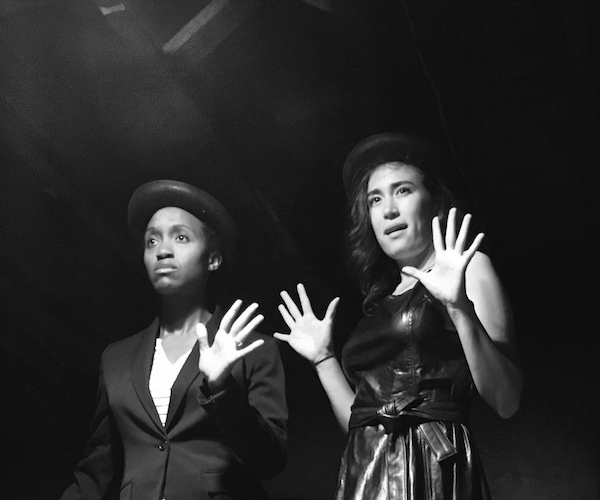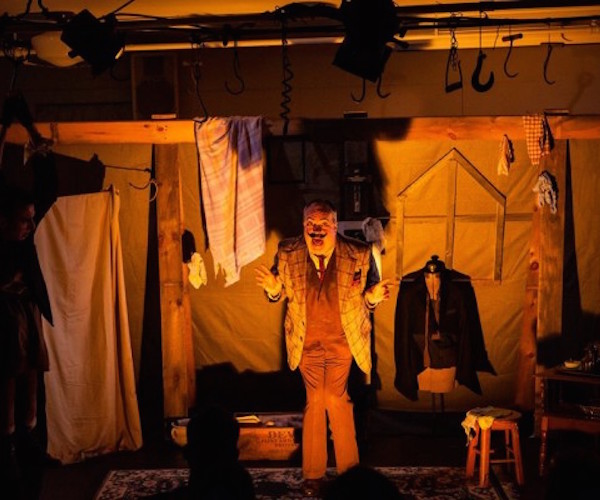Theater Review: A Wonderful “Journey to the Center of the Stage”
The Beau Jest Moving Theater staging succeeds at conjuring up the genially comic spirit of the late Larry Coen, a bounteously talented actor and director.
Journey To The Center Of The Stage by Larry Coen. Directed by Davis Robinson. Staged by Beau Jest Moving Theater at the Charlestown Working Theater, Charlestown, MA, through September 16.

Robin JaVonne Smith and Kathleen Lewis in the Beau Jest Working Theater production of “Journey to the Center of the Stage.” Photo: Courtesy of Beau Jest.
By Bill Marx
Theater can be a lot of things, but it isn’t often that a show sets itself up as a séance, a call-out to the spirits of the departed. But that is just what Beau Jest Moving Theater’s production of Larry Coen’s airily amusing Journey to the Center of the Stage does. Inspired by obvious affection, the staging succeeds at conjuring up the genially comic spirit of Coen (who died suddenly earlier this year), a bounteously talented actor and director who performed in a number of Beau Jest productions, most memorably (for me) the troupe’s brilliant stage adaptation of the cartoon strip Krazy Kat (as Officer Pupp) and as a delightfully sleazy visitor in Tennessee Williams’s The Remarkable Rooming House of Madame Le Monde.
On a personal note, Larry represented a rare spirit of conviviality between performer and critic, a no-man’s-land that is policed by a wall as tall and thick as even Trump would wish. Over the years, Larry messaged me from time to time on Facebook, sending in a meshuga horoscope on my birthday, agreeing with some of my theater columns and challenging others. (We both agreed on one seminal point: alarm at the increasing commercialization of Boston’s theater companies, from the large to the small.) When, in 2012, Larry directed Chinglish at the Lyric Stage Company, I gave the production a decidedly mixed review. Here is his response: “Thanks for the review of Chinglish! Very thoughtful, fair, and well-written.” For me, Larry was not only a fine comic actor and obvious mensch — he thought the battle to create high quality theater was about more than issuing blurbs, nursing hurt feelings, and pumping up ballooning egos. It is possible to talk about differences and give credit “across the great divide.”
Intriguingly, Larry’s homage to the theater features a moving opening alluding to the “great beyond,” a monologue (“Invisible/Visible”) delivered by a “Stage Manager” who sees the theater as a habitation for ghosts, dividing the audience members up into the families languishing in the graveyard at the end of Thornton Wilder’s Our Town. We are invited to play “dead” — as the dead. After that pensive opening, Coen moves in pretty much the opposite direction, serving up a deliciously slapdash collection of short skits (skit-ettes?) that revolve around matters in-jokey and theatrical.
Among them: a scene in the Colonial Theatre in the late ’50s featuring an actress who has been fired from the pre-Broadway try-out of an improbable musical about Mary Queen of Scots starring Ethel Merman (!); a pair hawking tickets (“Waiting for Fosse”) for the musical Chicago turn into figures from Waiting for Godot; actresses playing Goneril and Regan in King Lear (“Nothing My Lord”) toss good-natured barbs at a fledgling taking on the role of Cordelia; a veteran of far too many productions of A Christmas Carol supplies an unwitting send-up of Shakespeare’s Stages of Man speech via the roles in the Dickens chestnut — life is a journey in which you are cast further and further away from the spotlight, from Tiny Tim and Scrooge to the Ghost of Christmas Yet-to-Come. The hodgepodge leaves the melancholy of the opening scene behind — the infectious humor is good-natured and warm, with a touch of the catty here and there.

Larry Coen in the Beau Jest Moving Theater production of “The Remarkable Rooming-House of Madame Le Monde.”
We are moved about the Charlestown Working Theater for three of the skits, one of them a favorite: two somewhat befuddled middle-aged sisters talking (in an unusual location) about a just-seen production of A Streetcar Named Desire. (They were expecting something funny and light!) Their relationship, in a skewed way, reflects Blanche and Stella’s in the script. And I also enjoyed “The Curse of the Stage Hand,” a dramatization — going back to the Greeks via puppets — about why stage disasters happen.
The Beau Jest Moving Theater cast serves up the vaudevillesque antics in style, from the suave stage management of Robert Deveau to some zesty comic characterizations from Donna Asali, Kathleen Lewis, Robin JaVonne Smith, and Lisa Tucker. Davis Robinson is suitably scatterbrained/moldy as The Christmas Carol vet, though one yearns to see what Coen would have made of playing the incorrigible fossil.
At the end of the evening, an affecting scene filled with huzzahs to the power of the stage makes way for Coen himself to appear (the séance worked!) via videotape. It features a memorable bit with a stool that the “nervous” performer keeps moving fastidiously about … and … about … and … about … and … about. On glorious display was one (of the many) weapons in Coen’s comic arsenal, an Oliver Hardy-esque juxtaposition of the bulky and the delicate. One would have wanted to see more of Coen in action. The actor’s spirit is very present in Journey to the Center of the Stage, as is his love of all things theatrical. Yet, as in the final scene of Our Town, presence intensifies the sadness of absence, the sense of what has been lost.
Bill Marx is the editor-in-chief of The Arts Fuse. For over three decades, he has written about arts and culture for print, broadcast, and online. He has regularly reviewed theater for National Public Radio Station WBUR and The Boston Globe. He created and edited WBUR Online Arts, a cultural webzine that in 2004 won an Online Journalism Award for Specialty Journalism. In 2007 he created The Arts Fuse, an online magazine dedicated to covering arts and culture in Boston and throughout New England.
Tagged: Beau Jest Moving Theater, Charlestown Working Theater, Journey to the Center of the Stage
